Background
Faust, Drew Gilpin was born on September 18, 1947 in New York City. Daughter of McGhee Tyson and Catharine (Mellick) Gilpin.

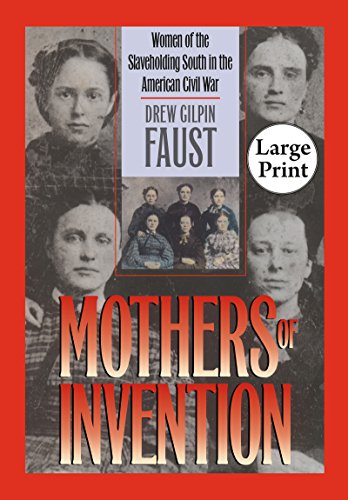
(When Confederate men marched off to battle, southern wome...)
When Confederate men marched off to battle, southern women struggled with the new responsibilities of directing farms and plantations, providing for families, and supervising increasingly restive slaves. Drew Faust offers a compelling picture of the more than half-million women who belonged to the slaveholding families of the Confederacy during this period of acute crisis, when every part of these women's lives became vexed and uncertain.
http://www.amazon.com/gp/product/0807855731/?tag=2022091-20
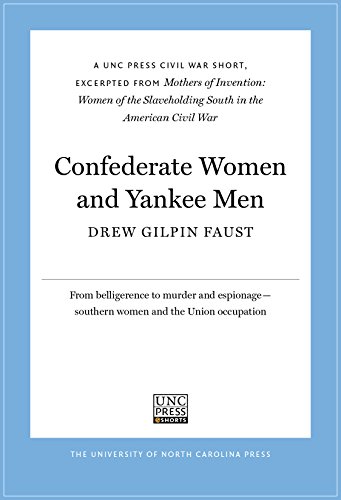
(When Confederate men marched off to battle, southern wome...)
When Confederate men marched off to battle, southern women struggled with the new responsibilities of directing farms and plantations, providing for families, and supervising increasingly restive slaves. Drew Gilpin Faust offers a compelling picture of the more than half-million women who belonged to the slaveholding families of the Confederacy during this period of acute crisis, when every part of these women's lives became vexed and uncertain. In this UNC Press Short, excerpted from Mother's of Invention: Women of the Slaveholding South in the American Civil War, Drew Gilpin Faust explores the legendary hostility of Confederate women toward Yankee soldiers. From daily acts of belligerence to murder and espionage, these women struggled not only with the Yankee enemy in their midst but with the genteel ideal of white womanhood that was at odds with their wartime acts of resistance. UNC Press Civil War Shorts excerpt compelling, shorter narratives from selected best-selling books published by the University of North Carolina Press and present them as engaging, quick reads. Produced exclusively in ebook format, these shorts present essential concepts, defining moments, and concise introductions to topics. They are intended to stir the imagination and encourage further exploration of the original publications from which these works are drawn.
http://www.amazon.com/gp/product/B007K95CIY/?tag=2022091-20
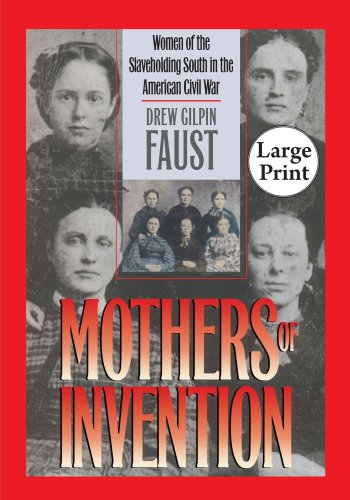
(When Confederate men marched off to battle, southern wome...)
When Confederate men marched off to battle, southern women struggled with the new responsibilities of directing farms and plantations, providing for families, and supervising increasingly restive slaves. Drew Faust offers a compelling picture of the more than half-million women who belonged to the slaveholding families of the Confederacy during this period of acute crisis, when every part of these women's lives became vexed and uncertain.
http://www.amazon.com/gp/product/0807866164/?tag=2022091-20

(Creation of Confederate Nationalism: Ideology and Identit...)
Creation of Confederate Nationalism: Ideology and Identity in the Civil War South CREATION OF CONFEDERATE NATIONALISM: IDEOLOGY AND IDENTITY IN THE CIVIL WAR SOUTH By Faust, Drew Gilpin ( Author )Feb-01-1990 Paperback By Faust, Drew Gilpin ( Author ) Paperback 1990
http://www.amazon.com/gp/product/B010YPXVGA/?tag=2022091-20
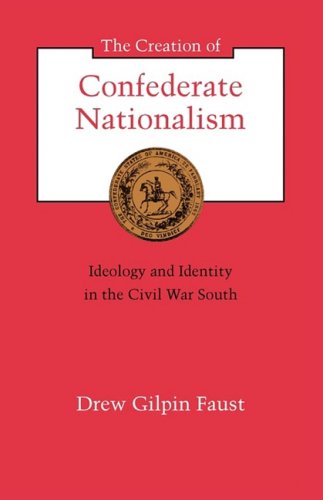
(Analyzes the role nationalism played in the Confederacy a...)
Analyzes the role nationalism played in the Confederacy and demonstrates how it changed and eventually defeated the social and political order it had been created to preserve.
http://www.amazon.com/gp/product/0807116068/?tag=2022091-20

( "We all live, I have come to believe, within the storie...)
"We all live, I have come to believe, within the stories we tell," writes Drew Faust, "for these tales fashion a coherent direction and identity out of the discontinuities of our past, present, and future." Forging an identity was an extraordinary task for white southerners of the late antebellum and Civil War era. In the critically acclaimed Southern Stories: Slaveholders in Peace and War, Faust investigates the experiences of wealthy planters, common soldiers, intellectuals, and Confederate women. She breaks especially fresh ground in her attention to southern thought and belief, to southern society and culture during the Civil War, and to the role of gender relations within the Confederate South.
http://www.amazon.com/gp/product/0826209750/?tag=2022091-20
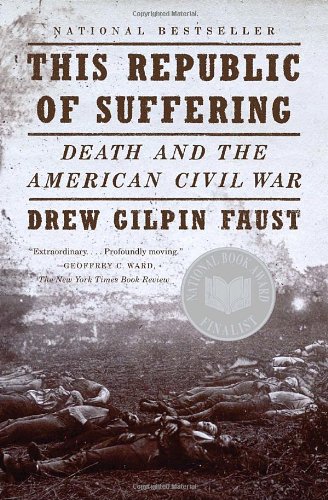
( More than 600,000 soldiers lost their lives in the Amer...)
More than 600,000 soldiers lost their lives in the American Civil War. An equivalent proportion of today's population would be six million. In This Republic of Suffering, Drew Gilpin Faust reveals the ways that death on such a scale changed not only individual lives but the life of the nation, describing how the survivors managed on a practical level and how a deeply religious culture struggled to reconcile the unprecedented carnage with its belief in a benevolent God. Throughout, the voices of soldiers and their families, of statesmen, generals, preachers, poets, surgeons, nurses, northerners and southerners come together to give us a vivid understanding of the Civil War's most fundamental and widely shared reality.
http://www.amazon.com/gp/product/0375703837/?tag=2022091-20
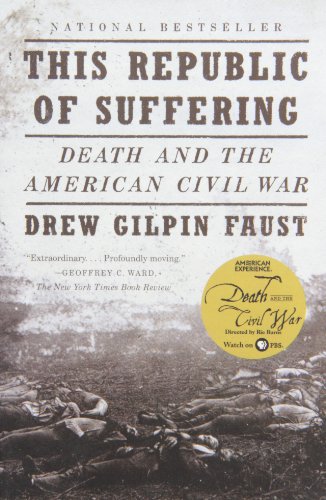
( More than 600,000 soldiers lost their lives in the Amer...)
More than 600,000 soldiers lost their lives in the American Civil War. An equivalent proportion of today's population would be six million. In This Republic of Suffering, Drew Gilpin Faust reveals the ways that death on such a scale changed not only individual lives but the life of the nation, describing how the survivors managed on a practical level and how a deeply religious culture struggled to reconcile the unprecedented carnage with its belief in a benevolent God. Throughout, the voices of soldiers and their families, of statesmen, generals, preachers, poets, surgeons, nurses, northerners and southerners come together to give us a vivid understanding of the Civil War's most fundamental and widely shared reality.
http://www.amazon.com/gp/product/B00EZFDC6U/?tag=2022091-20

( From his birth in 1807 to his death in 1864 as Sherman'...)
From his birth in 1807 to his death in 1864 as Sherman's troops marched in triumph toward South Carolina, James Henry Hammond witnessed the rise and fall of the cotton kingdom of the Old South. Planter, politician, and partisan of slavery, Hammond built a career for himself that in its breadth and ambition provides a composite portrait of the civilization in which he flourished. A long-awaited biography, Drew Gilpin Faust's James Henry Hammond and the Old South reveals the South Carolina planter who was at once characteristic of his age and unique among men of his time. Of humble origins, Hammond set out to conquer his society, to make himself a leader and a spokesman for the Old South. Through marriage he acquired a large plantation and many slaves, and then through shrewd management and progressive farming techniques he soon became one of the wealthiest men in South Carolina. He was elected to the United States House of Representatives and served as governor of his state. A scandal over his personal life forced him to retreat for many years to his plantation, but eventually he returned to public view, winning a seat in the United States Senate that he resigned when South Carolina seceded from the Union. James Henry Hammond's ambition was unquenchable. It consumed his life, directed almost his every move, and ultimately, in its titanic calculation and rigidity, destroyed the man confined within it. Like Faulkner's Thomas Sutpen, Faust suggests, Hammond had a "design," a compulsion to direct every moment of his life toward self-aggrandizement and legitimation. Hammond envisioned himself as the benevolent, paternal, but absolute master of his family and his slaves. But in reality, neither his family, his slaves, nor even his own behavior was completely under his command. Hammond ardently wished to perfect and preserve the southern way of life. But these goals were also beyond his control. At the time of his death it had become clear to him that his world, the world of the Old South, had ended.
http://www.amazon.com/gp/product/0807112488/?tag=2022091-20
academic administrator historian
Faust, Drew Gilpin was born on September 18, 1947 in New York City. Daughter of McGhee Tyson and Catharine (Mellick) Gilpin.
Bachelor magna cum laude, Bryn Mawr College, Pennsylvania, 1968. Master of Arts, University Pennsylvania, Philadelphia, 1971. Doctor of Philosophy, University Pennsylvania, Philadelphia, 1975.
Doctor of Humane Letters (honorary), Bowdoin College, 2007. Degree (honorary), Yale University, 2008. Degree (honorary), University Pennsylvania, 2008.
Degree, Peking University, 2008. Degree, Princeton University, 2010.
Assistant professor American civilization, University of Pennsylvania, Philadelphia, 1976-1980;
associate professor, University of Pennsylvania, Philadelphia, 1980-1984;
professor, University of Pennsylvania, Philadelphia, 1984-1989;
Stanley I. Sheerr professor of history, University of Pennsylvania, Philadelphia, 1988-1989;
Annenberg professor of history, University of Pennsylvania, Philadelphia, since 1989. Teaching fellow department American civilization University of Pennsylvania, 1972-1973, senior fellow, 1975-1976. Walter Lynwood Fleming lecturer Louisiana State University, 1987.
Member educational advisory board Guggenheim Foundation, since 1988. Consultant Before Freedom Came: AfricanAmerican Life in the Antebellum South, exhibition at Museum Confederacy, 1988-1991. National Endowment for Humanities panel Interpretive Research Program, 1987.
Member Pulitzer Prize History Jury, 1986, 90. Lecturer various colleges universities.
(Creation of Confederate Nationalism: Ideology and Identit...)
( "We all live, I have come to believe, within the storie...)
(When Confederate men marched off to battle, southern wome...)
(When Confederate men marched off to battle, southern wome...)
(When Confederate men marched off to battle, southern wome...)
( From his birth in 1807 to his death in 1864 as Sherman'...)
(Analyzes the role nationalism played in the Confederacy a...)
( More than 600,000 soldiers lost their lives in the Amer...)
( More than 600,000 soldiers lost their lives in the Amer...)
Trustee Andrew Mellon Foundation, 2002—2007. Member of American Philosophical Society, American Academy Arts & Sciences, Southern Association Women Historians (president 1998-1999, membership committee since 1988), History Society Pennsylvania (board member 1988-1991), American Studies Association (council member 1988-1990), Organization American Historians (chair progressive committee 1987, council member 1999—2002, chair Avery Craven Prize committee, 1991, 1997), American History Association (vice president professional division 1992-1992, council member since 1992), Southern History Association (executive council 1987-1990, chair nominating committee 1993, president 1999—2000).
Married Stephen Faust, December 28, 1968 (divorced 1976). Married Charles E. Rosenberg, June 7, 1980. 1 child Jessica 1 stepchild Leah.
